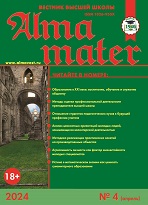UDC 37.09(091)
https://doi.org/10.20339/AM.10-20.108
Yu.V. Veldina is Cand.Sci. (Pedagogy), Ass. prof. e-mail: gusarovauvg@yandex.ru ; and O.A. Vagaeva is Cand.Sci. (Pedagogy), Ass. prof. e-mail: yurmashevj@inbox.ru at Penza State Technological University
Researched is continuity of secondary and higher vocational education’s system, gives is characteristic of the main teaching and learning activities’ methods in secondary and higher vocational educational institutions in the first half of the 20th century in Volga region. The choice of territorial framework is due to the fact, that Volga region is central one of Russia, the particularities of the system of secondary and higher vocational education’s development are typical for other regions of Russia. In the first half of the 20th century future specialists training’s methodological and methodological base and law-making execution of activities of secondary and higher vocational education institutions’ legal framework took place in Volga region, and that has determined the choice of chronological framework in this article. The authors address teaching and learning activities, used by teachers for learning process’s organization in Volga region’s educational institutions, pick out their advantages and disadvantages. The main methods are: “Dalton plan” with various forms of specially concerted activity, brigade-laboratory method, based on students’ work in team and tasks’ conduct independent operations, and comlpex method, formed up knowledge elicitation (for example, areas of interest and inclinations). Explanatory-illustrative methods of learning, procreational problem, partly search (heuristic), partly research (experimental) methods were used for preparing future specialists at universities.
Key words: education, Volga region, future specialists, teaching and learning activities’ methods.
References
1. Alexeev, G.A. To the problem of history of enlightenment in region of Middle Povolzhie. Cheboksary, 1990. P. 48–49.
2. GAUO (State archive of Ulyanovsk region). F. 190. Op. 1. D. 714. L. 60.
3. GAUO. F. 1. Op. 390. D. 71. L. 54.
4. GAUO. F. 390. Op. 1. D. 180. L. 35.
5. GAUO. F. 390. Op. 1. D. 192. L. 67.
6. GAUO. F. 390. Op. 1. D. 225. L. 16.
7. GAUO. F. 390. Op. 1. D. 315. L. 37.
8. GAPO (State archive of Penza region. F. r. 253. Op. 1. D. 810. L. 67.
9. GAPO. F. r. 253. Op. 1. D. 370. L. 139.
10. GAPO. F. r. 253. Op. 1. D. 370. L. 140.
11. GAPO. F. r. 253. Op. 1. D. 1430. L. 35.
12. GAPO. F. r. 253. Op. 1. D. 1430. L. 38.
13. GAPO. F. r. 2417. Op. 1. D. 67. L. 46.
14. TsGARM (Central state archive of Republic of Mordovia). F. R-2542. Op. 1. D. 204. L. 179.
15. Kalyagin, A.V. Development of higher schools’ science in region of Middle Povolzhie. Samara, 1991.
16. Mikheev, A.P. Penza state architecture building institute. In: Sketches of history of public education in Penza region. Penza, 1997. P. 370–373.
17. In memory of teacher. For engineering cadres. 1991. No. 14. P. 1.
18. Pashenko, V.G. Penza state university. Sketches of history and modern life. Penza, 2003.
19. Prokuntsev, A. Scientists of industry. For engineering cadres. 1968. No. 32–33. P. 2.











.png)






